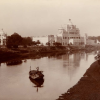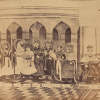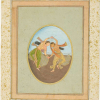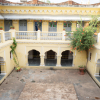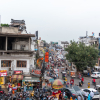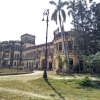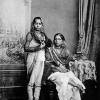Saubhagya Pai: Could you tell us a bit about yourself and this village?
Diyug Siddhi: I am Diyug Siddhi. I, along with my parents, brother and three sisters moved to this village of Tottilgundi from Nagashettikoppa near Haliyal in the year 1969. We were the only people in this village then, but today there are about 125 Siddhis residing in Tottilgundi. When we had arrived, there was nothing around. It was a dense forest with wild animals wandering about in these jungles and stretches of uncultivated land. My father Basteao Siddhi had left his ancestral house in Haliyal due to a family dispute, and for many months that followed, we were moving around in the jungle, changing jobs and houses till we finally found this place to build a new home.
SP: Could you tell us more about your family and what work you do currently?
DS: I have a brother and three sisters. The eldest is Rosine, followed by me, Devditt, Rocky and Mary. Almost everyone in this village is related to us. As our family grew, the village grew. We are predominantly into farming. We grow rice, corn and cotton in our farms. Different people own different sized plots of land but it usually varies between one to five acres each. Apart from farming, some also work as security guards, cooks, lawyers, etc., in other parts of the state, especially cities like Bangalore, Hubli and Mangalore.
SP: How did you arrive here? What were the place like back then?
DS: As you can see, this is a dense jungle. There is nothing around for many kilometres. Back in the day, our people led a nomadic life, so we would move from place to place in search of work. In 1965, my father moved to work in the forests of Supa, which we know as Joida now. He would cut trees and move in search of other similar work along with all of us. We would have changed seven to eight houses by the end of one season. After leading that kind of life for a very long time, in 1969, we came here.
My father finally decided that we had wandered enough in the forests and that we should cultivate land here. In those days land was being notified. One of the forest officers here said to my father 'You all look like farmers, why don’t you try getting some land sanctioned in your names. How long will you keep wandering with your kids across jungles. If you start farming, it may do you all some good. Otherwise you will continue being nomadic.' So, our father filled an application for the same and we got some land sanctioned in our name. This was during Indira Gandhi's tenure in the country. So once we got the confirmation about the land, we constructed a house here. Later, some more people from our community, who were also nomadic, moved here after hearing the news about land being sanctioned. This is how came to be. In this way, through a life of constant hardships and challenges, today we are here in this state. There were no roads, no drinking water or electricity at that time. The road that connects us to the nearest village, Kirwatti, was also built just last year.
SP: How did you find this place then?
DS: We are people of the forest. We used to live in Krishnagiri earlier. In Krishnagiri lived a man called Bhat who was quite famous in this area. One day we got to know there was a lake the nearby in Hosalli village where we could catch fish. So on our way to fish, we came across this land. For some reason we found it attractive and decided to settle here. We had had enough of leading a nomadic life. It was a huge forest then. The path from Hosalli village to the lake was completely covered by jungle but the trees were cleared to provide land for cultivation.
SP: How did you manage during those times?
DS: In those days we brought water from the lake every day for five years for our use. The lake was about one and a half kilometres away and we had to walk to fetch water. Five years later, we dug a well close by. This gave us better access to drinking water. We had to toil all day, and then at the end of the day would go to Kirwatti village to get flour to make rotis for dinnner. That was our condition. We did not have enough money to buy groceries for a week in advance. Conditions were that bad. Whatever we earned for the day would decide our meal. Sometimes even at eleven in the night, in the mucky, damp, dark path, in a time when there were no battery lights, we have had to walk to Kirwatti and come back. This is how we led our lives for many years.
SP: What about other amenities?
DS: It took a long time but finally we had electricity, bore well connection and roads. Although there were kuchha roads for the longest time, now in the last few years tarmac and concrete roads are being constructed for better connectivity.
SP: When did the school start?
DS: The school was started in the year 1984. It is a Kannada-medium government school for higher primary education upto class seven.
SP: Do kids only from the Siddhi community study there?
DS: Earlier kids from nearby villages such as Holankatte and Karavanagundi used to come too, because this was the first school in this area, but now schools have come up in those villages as well so only Siddhi kids study here.
SP: How many students are enrolled here and who are the teachers?
DS: There are a total of 19 students enrolled in this school. There are three teachers, two female and one male, who travel from Kirwatti and Yellapur everyday since there is no suitable accommodation for them here. They are non-Siddhis.
SP: And what happens to students after class seven?
DS: They go to other towns to complete their education. Mostly we send them to Yellapur or Karwar or Ankola where they stay in hostels. After schooling if they want to continue studying then some even go to Bangalore to pursue higher studies.
SP: What about your children? Where did they study?
DS: I have four children. They studied in Haliyal, at a local government school there. My wife is a teacher. We shifted to Haliyal because she found a job there. I also stay and work out of there. My eldest daughter is practicing law in Bangalore High court after completion of her LLB. My eldest son has completed his BCA from a college in Haliyal. My other two sons have completed a diploma in electrical.
SP: What is your religion?
DS: Officially we are all Catholic Christians in this village. But in our practices you will find traces of Hinduism, Islam and Christianity.
SP: Then what about the dargah?
DS: We want the dargah too and we want the Hindu gods too. And, of course, we want our gods too. We don’t discriminate between religions.
SP: What festivals do you celebrate?
DS: We celebrate many festivals across religions. We celebrate Ramzan in as grand a manner as we celebrate Christmas. We also celebrate Hindu festivals like Sankranti, etc.
SP: Do you fast during the month of Ramzan?
DS: No, only my eldest sister Rosine fasts during Ramzan. Right now, a Muslim saint is staying with us, who comes here every year during Ramzan season to sing songs. It is a means of entertainment for us too.
SP: Do you celebrate Ramzan at the dargah?
DS: Yes. Not only during Ramzan but we also pray at the dargah regularly. There is also a Goddess Kariamma temple closeby. Kariamma is believed to be the 'gramadevata' (village deity) here. The temple existed even before we arrived here. We take care of it now and visit regularly to offer our prayers and perform the rituals.
SP: And what about the church?
DS: On Sundays we visit the church and pray there too. The church was constructed more recently here. We pray in all these places. We do not discriminate between gods like others. For us, all religions are the same. All gods are the same.
SP: Do you have any dances or songs of your community?
DS: Yes. There are troupes from our community in Bhagwathi village who perform in different places. We also perform here occasionally but do not have a troupe as such. These days, everyone dances to recorded music during festivals or other celebrations. But that is not our culture. Our culture lies in dancing to drum beats and we need to maintain it.
SP: Could you sing a few lines from any of your folk songs?
DS: Yes. I can sing for you. We have a song about a reared goat being eaten by a tiger that goes thus:
Potyacha Asika mayena Bakre Poshile
Yev Yevge Maai Wagana Modile
Our songs are about the everyday life. They are simple lyrics that derive from our day-to-day happenings. For instance, here is another one:
Maadichare madkara
Maadichare madkara
Ghe paiso ani di maadi
Ghe paiso ani di maadi
Yo paiso majhya menati cho
Yo paiso majhya karnya cho
However, these songs are slowly vanishing. Now cinema music has entered our lives. In order to conserve our culture, we have set up these troupes that in some way represent our culture to the world. Earlier we would dance all night. This village never got tired of dancing. If we played the drums, I am sure even you would not be able to resist dancing.
